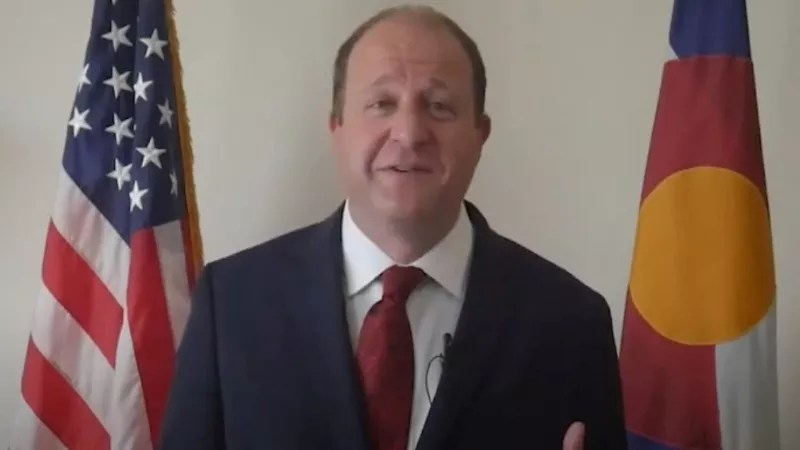

Audio By Carbonatix
In a July 28 press conference about Colorado’s response to COVID-19, Governor Jared Polis expressed great dissatisfaction with officials in Weld County who are choosing not to obey the statewide mask mandate and other aspects of his public health orders, but he stopped short of threatening a major crackdown.
In his words, “No government policy can force anybody not to be stupid – but I’m calling on Coloradans not to be stupid.”
The main section of Polis’s address provided an overview of data related to the novel coronavirus in the state, some of which has been a bit muddled of late; he revealed that a server error resulted in case numbers being skewed on July 27 and July 28. The governor recommended that those hoping to track cases look at the two-day total of 921, or roughly 460 per day – an improvement, given that other recent daily counts have been over 600. Meanwhile, hospitalizations for the virus currently stand at 251, a figure that doesn’t threaten to overwhelm intensive-care-unit capacity, and the positivity rate has been hovering beneath the 5 percent figure at which he said “alarm bells start ringing.”
If Colorado stays at this level, it will avoid being put on a prohibited-travel list for visitors from places such as New York. As a result, tourists from that state can come here and return home without having to go through a mandatory quarantine period, and Polis encouraged them to head this way as long as they abide by Colorado rules about face coverings, social distancing and so on. Said Polis, “I’d rather have New Yorkers visit than Texans or Floridians,” whose states are experiencing the sorts of spikes that Colorado would like to avoid.
At that point, Polis walked viewers through the four main metrics he uses to make decisions about policies to fight the disease. They include information generated by predictive modeling assembled by a team at the University of Colorado, which helps distinguish trends; hospital capacity; the growth in cases; and “what we learn from testing results and contact tracing.” He defined testing results as hard data and contact tracing as soft data, since it only provides “some sense of where did they get it, who got it from them and who they were exposed to. We get what we can from that. We don’t always see everything from the counties, but we get enough from wherever we can.”
Polis also confirmed that fifteen counties that have received variances from the Safer at Home public-health order are in danger of losing the privileges because they’ve exceeded the benchmarks set by state officials. He encouraged those municipalities, as well as counties that haven’t received variances but are seeing their curves tilting upward, to work at the ground level to reverse such trends, since the state would prefer to “address problems with a scalpel, not a meat cleaver.”
Weld County is among the places in Colorado currently considered a red zone, but this status hasn’t convinced commissioners there to tighten up and fly right by Polis’s standards – a topic that was mentioned by multiple journalists during a question-and-answer period. Of particular note was a rodeo and concert event near the community of Hudson this weekend, at which thousands of attendees crowded together at distances of far less than six feet from each other and largely eschewed facial coverings. Yet the Weld County Sheriff’s Office didn’t put the hammer down, raising fears that more large-scale gatherings in the area over the next month or so could take place despite possible dangers for everyone involved.
This possibility worried Polis, who made an analogy comparing “juggling knives in the privacy of your own home” to “driving drunk.” People who take part in the former activity might hurt themselves, he pointed out, but those intoxicated behind the wheel are “putting others at risk. You are risking the lives of innocent people in our state. And we will explore every available option to hold people accountable and protect the health and safety of people in Colorado.”
Trouble is, the only specific option Polis mentioned was yanking the liquor license of bars or restaurants that are open illegally, which wouldn’t address huge productions like the Hudson get-together.
Polis also poured cold water on the prospect of a special legislative session related to making sure that schools in Colorado are open for in-person learning – a proposal from elected Republicans that includes potential funding losses and closures for those institutions that don’t obey. In rejecting the concept, he said that he’d only back such a session if there was a chance for the measure in question to pass – and given that Democrats in the majority of both houses in the Colorado Legislature aren’t on board, the GOP suggestion wouldn’t qualify.
Other questions were spawned by an exceptional investigative report by Colorado Public Radio about behind-the-scenes turmoil at the Colorado Department of Public Health and Environment and gripes from local county public health officials. Polis didn’t get into the nuts and bolts of the complaints and used an unfortunate phrase – “There’ll be plenty of time for a post-mortem after this is over with” – to suggest that everyone involved should set their beefs aside and work toward the common goal of minimizing the spread of COVID-19.
“I think everyone across our society is stressed,” he added. “And for every public-health official, I think stress is an understatement right now. Of course people are going to lash out at everybody – lash out at the federal government, lash out at elected leaders, lash out at us. It’s a completely normal reaction.”